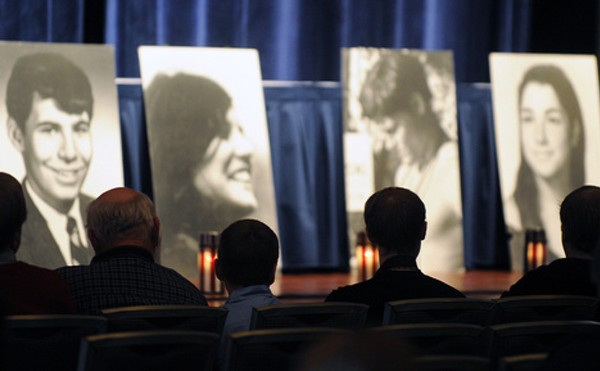
When Shanley wrote “Sailor’s Song,” he had antiquity in mind. In his foreword, he writes, “Cynicism was a school of Greek philosophy. They believed that one should live a virtuous life, eschew wealth and status, in order to find happiness.”
Enter the main character, Rich. He is an “ordinary” guy unhappy with life. As a commercial seaman, he has had ample time on the water to form philosophies about life and women. Like a poet, one of the first and only things he addresses to the audience is, “If you could dance with the days of your life, if you could take life by the wrist and dance, I think it would be a waltz. Forward and back, sad and happy, high and low.”
The waltz makes several appearances, acting as an outward aesthetic to fundamental events. It reinforces the dreaminess of Rich (Andrew Pyle), who recounts a chance encounter with two sisters — he has romantic inclinations for both — while his aunt Carla (Delilah Smyth) is in a coma.
Lucy (Leah Michelle Roberts) is the normal sister while Joan (Kara Reeder) is the eccentric sibling. Lucy works at the bank; Joan is an automatic writer, allowing her hand to act as a gateway for the dead to communicate with the living.
Roberts plays Lucy as a woman with an almost school-girl infatuation with Rich. One of the best scenes involves Rich explaining a “Russian confession” to Lucy — in essence, it’s a rap sheet about a man’s past ornery ways, which only a woman can absolve when she consents to marry him.
Reeder is hilarious, painting Joan as a blank-faced New Ager, typically befuddled and yet sharp as nails with her clarity on life. She plays with the hem of her dress at various times and even dances to her own music during the waltz scenes.
Tad Chitwood gives a powerful performance as Rich’s uncle John, who copes with grief in an unconventional way, uncouthly asking about the sisters and offering Rich advice while drinking away the pain of watching his wife Carla die. John’s emotional executions vary from comedic to tragic. While “Sailor’s Song” is easily Rich’s song, John is also living in denial.
The play’s themes — fate, death and love — could have made it stale. Yet the script and the actors are refreshing. Each sister represents a different fate for Rich.
Director Amy Attaway has the actors dress in “everyday” clothing, countering the vintage waltz and making the audience feel as if they have entered someone’s memory.





